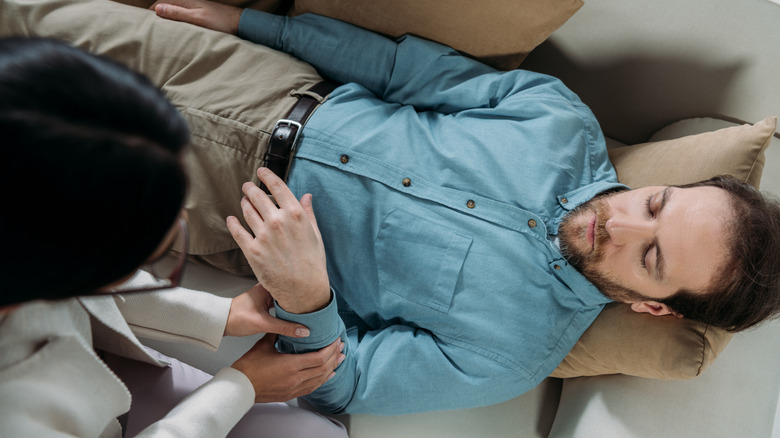Can Hypnosis Help With Anxiety?
Anxiety is something Americans are all too familiar with — it affects 40 million American adults or roughly 18% of the population each year, according to the Anxiety and Depression Association of America (ADAA). Anxiety disorders can be debilitating, interfering with daily activities or potentially leading to panic attacks (via Mayo Clinic). Since anxiety affects nearly 1 in 5 adults, it's the most common mental illness in the United States, per ADAA.
Rates of anxiety symptoms have increased during the COVID-19 pandemic, disproportionately affecting younger adults, people of color, and essential workers (via Centers for Disease Control and Prevention). While anxiety disorders are very treatable, only 36.9% of those suffering receive treatment (via ADAA). They can often co-occur with depression, eating disorders, and attention deficit hyperactivity disorder (ADHD) and are typically treated with therapy and medication. While there are plenty of popular treatments for anxiety, hypnotherapy is becoming an increasingly well-known tool for easing symptoms of anxiety.
There's scientific proof that hypnotherapy can help
You might think of hypnosis as going into a trance and losing all control, but hypnotherapy is actually a complex process that allows you to explore your subconscious mind (via Healthline). A skilled practitioner guides the session, helping you to relax and "recondition" your anxious brain. By facing hypothetical anxiety-inducing situations while in a hypnotic state, your brain becomes more open to suggestions and can practice de-escalating reactions like shortness of breath, nervous stomach, increased heart rate, and feelings of fear.
In a 2016 study by the Stanford University School of Medicine, brain scans from 57 participants undergoing guided hypnosis showed that different areas of the brain have more activity and connectivity when hypnotized. These changes in the brain resulted in more focused attention, more physical and emotional control, and less self-consciousness. "Hypnosis is the oldest Western form of psychotherapy, but it's been tarred with the brush of dangling watches and purple capes," said Dr. David Spiegel, the study's senior author. "In fact, it's a very powerful means of changing the way we use our minds to control perception and our bodies."
Only 10% of the population is considered "highly hypnotizable," according to the Stanford study. But hypnosis on its own can be similar to meditation and can still be helpful for putting you in a relaxed state to address anxieties (via Healthline). Since hypnotherapy can uncover trauma, be sure to work with a licensed mental health provider who has extensive training in hypnosis.


